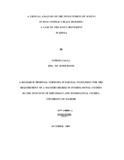| dc.description.abstract | Scholars have argued that conflicts are endemic in society. They have further argued that
conflicts are not necessarily a negative occurrence as they help people to understand
themselves and their relationship better. It provides the chance to re-examine
relationships, and try to make them better and stronger. It is therefore important to learn
how to manage it properly. There are many actors who are trying to contribute in the
efforts to manage different conflicts in Africa. Although governments play the major role
in conflict management in the region, a lot of non-governmental organizations have also
entered the scene, with varying contributions to the problem.
As much as there are multiple actors in conflict management, so are there multiple
approaches to conflict management. Peaceful approach to conflict management nests on
Article 2(4) of the United Nations Charter that negates the use of force in conflict
management. In Article 33(1), the Charter specifies the methods of peaceful settlement of
disputes as; negotiation, enquiry, mediation, conciliation, arbitration, judicial settlements,
resort to regional agencies or arrangements, or any other peaceful means of their own
choice. At the same time, the Organisation of African Unity (OAU) now called the Africa
Union (AU) specifies the methods in Article 3(4) as negotiation, mediation, conciliation,
and arbitration. As multiple approaches to conflict management continue to be used in
many conflicts around the world, such as in the great lakes conflict system, durable peace
has proved to be elusive as has been the case in Rwanda and Burundi. Fresh waves of
violence keep erupting.
The same can be said of the conflicts in Kenya, such as the post election violence in
1992, 1997, and 2007 with the one in 2007 reaching unprecedented heights. Debates have
emerged as to alternative or additional approaches to conflict management that can
realize durable peace. One such approach that is gaining ground especially among new
actors in the conflict management such as NGOs and development agencies is peace
building. This is based on the observation that once conflicts have been resolved, there is
hardly any follow up, and so the combatants find themselves with no means of
reconstructing their lives. With such hopelessness and sometimes frustration, and with no
rehabilitation mechanisms in place, they often fall back to violence, and as expcctcd.
violence begets violence.
This paper studies the peace building initiatives of the Scout Movement in Kenya, as a
ease study of the importance of peace building as an alternative approach is seeking
durable peace in society. | en_US |



